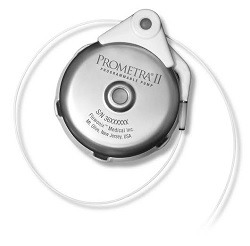 The first patients have been implanted with the Prometra II Programmable Infusion System in the ADDRESS (Australian direct drug administration for refractory epilepsy)clinical trial at St Vincent’s Hospital, Melbourne, Australia. The therapy, jointly developed by Flowonix and Cerebral Therapeutics, features a micro-infusion device that tightly controls drug delivery to a region of the brain for patients with medically refractory epilepsy.
The first patients have been implanted with the Prometra II Programmable Infusion System in the ADDRESS (Australian direct drug administration for refractory epilepsy)clinical trial at St Vincent’s Hospital, Melbourne, Australia. The therapy, jointly developed by Flowonix and Cerebral Therapeutics, features a micro-infusion device that tightly controls drug delivery to a region of the brain for patients with medically refractory epilepsy.
ADDRESS is the first multicentre dose ranging clinical study assessing intracerebroventricular (ICV) delivery of the drug valproate (valproate sodium) in patients with focal seizures, with temporal lobe onset with or without secondary generalisation. Nine patients will take part in this experimental treatment, wherein patients will receive ICV administration of valproate via the Flowonix Prometra II Programmable Pump. Clinicians associated with the trial are encouraged with the preliminary results in reducing the number of epileptic seizures.
“We are really excited to be able to study this new treatment option for patients in the ADDRESS trial—it may offer new hope to those with uncontrolled epilepsy,” states Mark Cook, chair of Medicine and director of Neurosciences at St Vincent’s Hospital in Melbourne, Australia.
Refractory epilepsy, referred to as uncontrolled, intractable, or drug-resistant epilepsy, occurs when medications do not bring seizures under control. Epilepsy patients that are refractory to oral anti-epileptic drug treatment have significantly higher mortality, higher morbidity, higher economic costs and diminished quality of life compared to those who suffer from epilepsy that can be adequately controlled with medical management. About one in three people with epilepsy progress to refractory epilepsy.
“The ability to target-deliver anti-epilepsy medication through an established infusion pump delivery could be a treatment with profoundly positive ramifications,” stated Ashwini Sharan, Neurosurgical and Neurological Professor at Jefferson University, and president of the North American Neuromodulation Society. “This is the first time in the world this approach is being taken.”
Dan Abrams, chief executive officer of Denver-based Cerebral Therapeutics, noted that this is the first time implantable programmable pumps have been used to deliver medication directly to the brain, in the same way they are used to manage spinal pain by delivering medications to the intrathecal space.
According to the World Health Organisation, nearly one person in six suffers from some type of neurological condition, amounting to over one billion individuals worldwide. Many neurological conditions can be addressed with medications, but there is still significant unmet medical need.
“Neurological disorders can be devastating to patients and their families, who are often left with few options,” says Larry Heaton, chief executive officer of Flowonix Medical, Inc. “Flowonix is emerging as a world leader in implantable drug infusion systems used to treat pain, and we have particular expertise in the accurate and reliable delivery of microdoses of medication. As the first trial of its kind, the ADDRESS study is a significant milestone for Flowonix Medical, Inc., Cerebral Therapeutics, the healthcare community, and patients worldwide. If the clinical study results in demonstrated positive outcomes, it would benefit patients who have refractory epilepsy and establish targeted drug delivery directly to the brain. It is gratifying when technological advancements offer such exciting possibilities for a new group of patients in need.”
The Prometra Programmable Infusion System is FDA approved for intrathecal infusion of Infumorph(perservative-free morphine sulfate sterile solution) or preservative-free sterile 0.9% saline solution (Sodium Chloride Injection, USP). The Prometra II Pump is not approved for the ICV administration of valproate in the USA or Australia, and is being studied as an investigational use only device in Australia.












